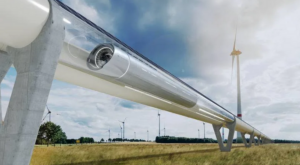From endless queues to cancelled flights and lost luggage – if you’ve experienced any of the chaos plaguing European airports this summer, it might help to imagine a future in which international travel is smoother and doesn’t revolve so much around flying.
Picture this: the year is 2045. You’re standing on a platform in Berlin awaiting a sleek Hyperloop pod that will glide into the station to a noiseless halt and then deposit you in Paris an hour later, ready for your morning meeting.
In the afternoon, you’ll take another southbound pod on a leisurely trip to Barcelona for the weekend, a journey that will take no more than 90 minutes.
The speed and ease is no longer a surprise to you, because in the last quarter-century, almost all travel throughout Europe has shifted from the skies to the ground.
Russia is wiring dollars to Turkey for $20 Billion nuclear plant
Short-haul flights are nothing but a relic of a carbon-fuelled past.
It might seem like the stuff of science fiction, but there are real reasons to believe that a future of mobility like this could be possible.
The climate crisis is focusing the minds of European policymakers on their stated goal of carbon neutrality by 2050. Many are betting on rail to get us there.
Read more: yahoo
Ask me anything
Explore related questions





